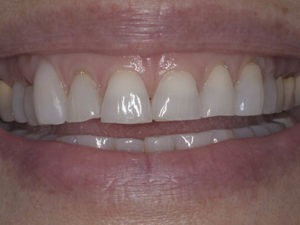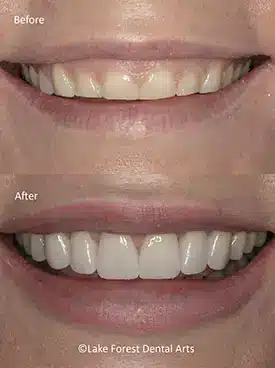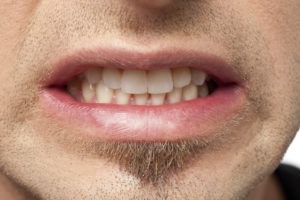
Do you clench your teeth for no apparent reason? Many people perform this action subconsciously. Some may do it during stressful situations, while others may only do it during their sleep. Teeth clenching can have detrimental effects on your teeth. Your overall health can also be severely impacted.
Breaking the habit while awake is not nearly as difficult as attempting to do so while asleep. This is because it’s nearly impossible to break an involuntary action if it occurs while you sleep.
What causes teeth clenching or grinding?

Tooth grinding and clenching caused heavy wear of this woman’s teeth. She elected to have a gum lift and veneers place.
There are many causes for teeth clenching or grinding, also called bruxism. Some people have more than one cause at play. Experts cite a few basic indicators as to why this common occurrence affects so many people.
- Genetically linked predisposition
- Anxiety and/or stress
- Children grind during the transition between baby teeth and adult teeth
- Depression
- Earache
- Eating disorders
- Medical conditions
- TMJ Headache
- Tooth sensitivity of sweets and/or temperature extremes
- Insomnia
- Sore jaw muscles or painful tight jaw
What side effects are often associated with teeth clenching?
Once you know what is causing you to abuse your teeth and jaw muscles, it is time to take action to remedy the problem. The quicker you find a way to treat this condition, the less likely you’ll have to deal with long term effects that can negatively impact your life. In fact, you may already be experiencing some or all of these issues and not even realize it. Some of the issues you may be experiencing due to teeth clenching or grinding include the following:
Chipped or broken teeth
The constant grinding of your teeth can cause undo wear and tear to your enamel. This can lead to short teeth, chipping or breaking due to the excess stress. Depending on the severity of the grinding, veneers may be an option for worn teeth.
As much as 10% of the population experience this each morning upon waking. This is due to clenching or grinding of teeth throughout the night while you sleep.
Chronic headaches
A common symptom of bruxism is getting headaches. An overly exerted temporalis muscle along with facial muscles are the cause of recurring, painful headaches.
Restricted jaw and facial movements
Facial movements may appear stiff or unnatural. This can be due to pain that occurs with the opening or closing of the jaw. You may find yourself performing odd jaw exercises in order to temporarily alleviate the pain.
Clenching or grinding of the jaw affects more than just the teeth. The constant motion can also cause the gums to recede. Once this occurs, teeth will become misaligned and major surgery may eventually be required to restore your teeth to normal.
Sleep deprivation or poor sleep
Lack of sleep is detrimental to one’s health. Over time, sleep deprivation can cause memory issues, brain fog, and other more severe problems. Quality sleep if necessary to our health and well being.
Relationships issues
As mentioned previously, bruxism is classified as a sleep related disorder. Some relationships can be under extreme amounts of stress due to teeth grinding or clenching. This is particularly true at night when your significant other is attempting to sleep. The constant grinding or movement of the jaw can deprive your partner of the sleep he or she so desperately needs.
Dealing With Your Clenching and Sleep Bruxism
Clamping your teeth and bruxism are considered to be sleep disorders, and is often linked to sleep apnea. Oftentimes, the predisposition to grind and clench has a genetic link.
Currently there is no treatment that can permanently prevent a person from clamping their teeth together. The best way to find a solution that works for you is to speak with your dentist regarding your options.
Your dentist may provide a referral to a sleep specialist in order to get more answers. Behavior modification techniques have had limited success. Muscle relaxants work, but severely affect your lifestyle. Protecting your teeth with a mouth guard or night guard is an effective method to temporarily remedy tooth abuse while sleeping.
 What is TMJ and how does clenching affect it?
What is TMJ and how does clenching affect it?
TMJ stands for temporomandibular joint. Located in front of each ear, your TMJs connect your lower jaw to the rest of your skull, and allow your jaw to open, close, and move around as needed.
Teeth clenching can apply excess pressure on the areas around the jaw and lead to TMJ issues. TMJ disorder can refer to any of a number of issues that affect one or both of your TMJs. There are various options for TMJ treatment.
The structures of the TMJ are very close to the ear canal, and tooth grinding or clenching can cause pain, as well as temporomandibular joint disorder, also known as TMD. Ear pain or aches are often caused by referred pain, or pain that comes from somewhere nearby, but is felt in another place.
TMD can be caused by a side array of factors, including:
- Injury to the jaw or face
- Teeth grinding
- Misaligned jaw
- Wisdom teeth
- Stress
- Poor dental alignment
- Arthritis
Learn more about chronic clenching your teeth
Your dentist will conduct a thorough examination to determine if your teeth clenching has caused any damage to your teeth or gums. He will also ask several questions about your oral health. The answers you provide will allow him to determine an appropriate course of treatment.
As part of the exam, the movement of the jaw is assessed to see if there are any issues with your joints. An X-ray may be ordered to provide a better view of the teeth and bone.
If necessary, a bite guard may be ordered to help prevent further damage. Lifestyle modifications will also be discussed during your appointment. When it comes to professional advice, diagnosis, or treatment options a TMJ expert can assist you every step of the way.

 What is TMJ and how does clenching affect it?
What is TMJ and how does clenching affect it?